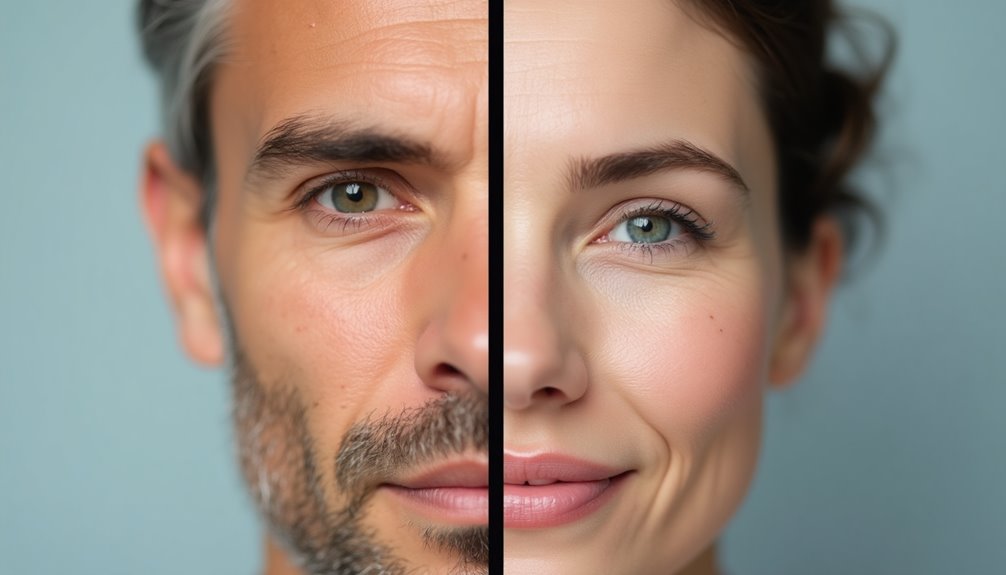You've probably noticed how your skin changes as you age, but have you ever considered the role your hormones play in this process? For women, the decline in estrogen during menopause directly impacts collagen production, leading to noticeable changes in skin elasticity and thickness. Men, on the other hand, experience a more gradual decrease in skin collagen due to the steadier levels of testosterone. This gender-specific dynamic raises intriguing questions about how we might use this knowledge to combat aging effectively. What if there were targeted strategies that could help you maintain your skin's youthfulness based on your hormonal profile?
Key Takeaways
- Estrogen boosts collagen production, leading to higher skin elasticity in women pre-menopause.
- Menopause causes a drop in estrogen levels, accelerating collagen loss in women.
- Men maintain higher collagen levels longer due to testosterone, which preserves skin thickness.
- In men, testosterone levels decrease gradually, causing a slower reduction in collagen.
- Hormone replacement therapy can help manage collagen decline in both men and women post-menopause.
Hormonal Impact on Collagen
Estrogen plays a central role in your skin's health by boosting collagen production, which is necessary for maintaining skin elasticity and firmness. As women, your body relies heavily on estrogen to stimulate fibroblast activation, cells that are essential for producing collagen. This relationship is crucial to keeping your skin firm and youthful.
However, as you approach menopause, you'll notice that your estrogen levels start to decrease. This decline is directly linked to a decrease in collagen production, which can lead to noticeable changes in your skin's elasticity and firmness.
Post-menopause, estrogen levels drop notably, accelerating collagen loss and making the effects more apparent.
It's important to understand that while estrogen levels don't exactly mirror collagen production, they're closely connected. This means that maintaining a balance in hormone levels can greatly impact how firm and elastic your skin remains over time.
You're not just at the mercy of your hormonal shifts; you have the freedom to influence your skin's health through various means, whether it's through diet, lifestyle choices, or medical interventions designed to balance hormone levels. Embrace this power to sustain your skin's vibrancy and firmness despite the natural aging process.
Gender Differences in Aging
Gender differences in aging are markedly evident, particularly in how men and women's skin changes over time. You might notice that men often maintain a more youthful skin appearance longer than women. This is largely due to higher collagen levels and the protective effects of testosterone, which help preserve skin thickness and resilience.
In contrast, women face a sharper decline in collagen as they reach menopause. This significant hormonal shift, particularly the drop in estrogen, leads to faster collagen loss and more pronounced signs of aging.
The aging process isn't just about genetics; it's deeply intertwined with hormonal changes. For women, estrogen deficiency after menopause accelerates the decrease in skin elasticity and firmness. Meanwhile, men experience a more gradual decrease in skin collagen due to their lower estrogen levels, which doesn't impact them as sharply.
Understanding these gender differences can empower you to tailor your approach to skin care and lifestyle choices. While both men and women might consider collagen supplementation, the underlying hormonal influences mean that strategies could vary. Paying attention to how testosterone and estrogen uniquely affect the skin can guide more effective anti-aging interventions, ensuring you maintain your freedom to look and feel your best.
Benefits of Collagen Supplementation
Collagen supplementation offers a powerful tool in the anti-aging arsenal for both men and women. By beginning to use collagen supplements from your mid-20s, you're taking a strong, preventative measure against the natural decline of collagen production caused by aging and shifts in hormone levels. This proactive approach not only empowers you but also paves the way for maintaining youthful essentiality longer.
As you age, your skin's collagen density decreases, leading to the common signs of aging. However, by replenishing your body's collagen, you can enhance skin hydration, improve skin health, and soften aging effects. It's like giving your skin a fighting chance to retain its elasticity and firmness even as the years roll by. This is particularly beneficial as you approach menopause, a time when hormonal changes can dramatically impact skin appearance.
Beyond just the skin, collagen supplements contribute to better joint health. As joints can wear with age, boosting your collagen intake helps maintain joint function and comfort, letting you move more freely and stay active. Overall, you'll feel healthier and stronger, which is a demonstration of collagen's broad-reaching benefits in your body.
Clinical Insights on Collagen
Building on the benefits of collagen supplementation, let's explore the scientific backing that reinforces these claims. Clinical trials have been a game-changer in understanding how collagen can enhance your skin care routine. For both men and women, daily intake of 10g of high-quality collagen has shown significant positive effects—reducing wrinkles, improving skin hydration, and increasing elasticity. You're not just taking a supplement; you're embracing a freedom for your skin to regain its youthfulness and resilience.
INGENIOUS's large-scale clinical trial has particularly highlighted how essential the quality of collagen is. With the right levels of estrogen in women, the rate of collagen production can be optimized, counteracting the natural collagen changes and skin thinning that occur over time.
This is crucial because as estrogen levels fluctuate, so does the quality of collagen, affecting both appearance and function.
Strategies for Collagen Maintenance
To effectively counter the natural decline in collagen as you age, consider integrating several proactive strategies into your daily routine.
First, you might explore collagen supplements, which can bolster your natural collagen production and help maintain your skin's elasticity and your joints' health. For women, especially during menopause, hormone replacement therapy (HRT) can greatly enhance collagen content, leading to thicker, more hydrated skin.
Don't overlook the power of lifestyle choices. Quitting smoking and reducing sun exposure protect your skin's collagen from deteriorating prematurely. Embrace a diet rich in antioxidants and omega-3 fatty acids to support your skin's structure and enhance collagen synthesis.
Moreover, engaging in regular exercise, particularly strength training, can have profound effects on collagen by increasing muscle mass and strengthening connective tissues. This isn't just about looking good; it's about keeping your body robust and resilient.
Lastly, ensure you're staying hydrated and managing your stress levels. Both are essential for maintaining peak collagen levels and overall health. By adopting these strategies, you're not just preserving collagen; you're embracing a lifestyle that prioritizes freedom and vitality, allowing you to thrive at any age.
Conclusion
As you've seen, hormonal changes greatly impact collagen levels differently in men and women. You can combat these changes by considering gender-specific strategies for collagen maintenance. Incorporating collagen supplements tailored to your hormonal needs can help preserve your skin's elasticity and thickness. Remember, understanding your body's unique needs allows you to age gracefully and maintain healthier skin, so stay informed and proactive about the choices you make for your skincare routine.


